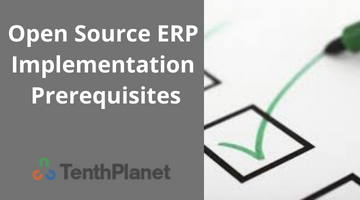Open Source ERP Implementation Prerequisites

Are you planning to implement ERP in your business? The first thing comes in your mind is “ERP systems are a costly investment”. But, in the long run, ERP systems will yield more cost savings. So, Decision-making on what ERP to choose whether open source or proprietary systems is a must.
Before making a decision on which ERP system implementation, top level management such as CEO, CTO, COO, CFO must have a convincing answer for the questions below in terms of cost, features and stability:
Cost:
- How much money, time and resources needed after implementing ERP?
- How much to pay upfront to deploy and get software beta version?
- Will IT cost and operations impact by ERP?
- What is the exact timeline to deploy ERP in your enterprise?
Features:
- What are the features needed specifically in open source ERP for our business?
- Which programming language in which the ERP is built with?
Stability:
- Is the ERP system in which Business Data is secure?
- Is there active community and support for ERP you decided?
- Can we handle open source ERP with in-house resources?
- Are support protocols available if service or data drops while migration?
Common ERP implementation mistakes:
Even large organizations have faced difficulties in ERP software implementation. We have listed the top 5 ERP implementation pitfalls below.
Pitfall 1: Blindly deciding new system solve all problems:
Before deciding to implement a new system, check if a new system is really needed. Most of the ERP consulting firms will say, new system is needed. But, in most cases refinement of the existing system is suffice. If you are not able to analyze it, you can hire an independent Open Source ERP consulting company, like TenthPlanet, to get exact opinion about if new system is required or not.
Pitfall 2: Getting fascinated by ERP software features:
While analyzing and choosing an ERP implementation, don’t be an enthusiast for software features. Ask your project team to properly find out specific feature needs, scope of project and overall cost for ERP implementation.
Pitfall 3: Planning without objectives:
Creating a plan without any objectives will not be effective and it won’t help you. Your plan must have a clear and well defined objectives, Key Performance Indicators, project budget and timeline for completion of ERP implementation.
Pitfall 4: Inadequate resources:
It is very important to allocate the resources properly. All workforce in your project team should be very committed so that chances of ERP failure is reduced and ensure success.
Pitfall 5: Avoid customizing ERP too much:
Always keep an eye on customizations done in ERP implementation. Keep it less as much as possible. Do not over do it and let it get out of your control. It is very hard to keep the in-house resources knowing all the changes made in ERP. The chances of cost overruns are high as you have to outsource the ERP for maintenance.
Still in confusion with what open source ERP to Choose?
We at TenthPlanet providing ERP consulting services for open source ERP software such as Compiere, Adempiere, Idempiere, Openbravo.
